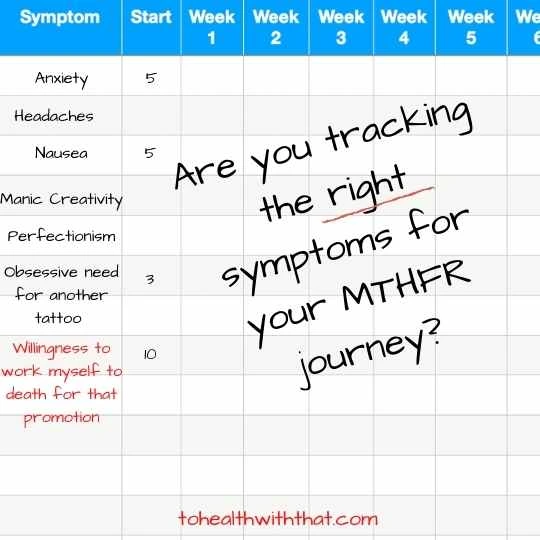Part of successfully working with any health issue is knowing when you’re moving in the right direction and when you aren’t. Oddly, it’s trickier then you might think – especially with MTHFR and methylation issues.
Why Are We Even Talking About This? Of Course I Know When I’m Getting Healthier.
Here’s the thing. Most conditions have clear symptoms that are similar for most people and obvious when they happen. If you get migraines, you often know when you’re going to have a migraine (by aura or by repeating pattern – say association with hormone cycles or weather), you CERTAINLY know when you have a migraine, and you know when it’s gone. You can track the number of migraines per month and it’s all pretty easy to tell when it’s getting better or getting worse.
MTHFR is not so cut and dry, partly because it looks very different in everyone who has the polymorphism, and partly because some of the indicators that your methylation is getting out of control are things that we normally consider to be either positive traits, or personality traits.

There Are So Many Ways To Experience MTHFR
Within my clients, I can honestly say that no two MTHFR folks have the same spectrum of symptoms, although often I see repeating patterns. Also, it’s hard to predict which symptoms will change as a person moves toward health. This is why symptom trackers are so important. Questions about progress can be very vague, but if you’re tracking your symptoms regularly then you can begin to see a pattern that might not have been noticeable before.
How To Use A Symptom Tracker
Symptom trackers are simple charts where you can record a list of your symptoms, then track them on a scale from 1 – 10 each week (or each day if you’re a geek for tracking like I am). These aren’t complicated, but they are a super valuable life hack. The complicated part, is knowing what to include on your chart. If you’d like a free .pdf version of the symptom tracker I use, just sign up for the mailing list below the article or in the sidebar and you’ll get the free download.
What Symptoms To Include:
With MTHFR there are four big categories of symptoms to include on your tracker.

- Obvious symptoms that are troublesome to your health, happiness, or mental wellbeing. These are the ones everyone thinks of – like headaches, joint pain, sleep disturbance, nausea, eye twitch, hormonal issues, whatever.
- Symptoms from within your Basic State group. If you aren’t sure what I mean by Basic State group, follow the link to the article and see where you fit in. If you’re an undermethylator you will notice a list of signs and symptoms and personality traits that might be related. Anything you see on that list that applies to you, also write in your symptom tracker. If you’re methylation neutral, then write any symptoms that you experience from either side of the list.
- Warning signs of imbalance from your Basic State group. This can be tricky, because most of us really love the positive traits from our basic state, but with MTHFR even positive traits come with hidden issues. Overmethylators, like myself, are highly creative and that is a huge gift and one that I prize above all others in myself, but it can also be a sign that I’m moving toward unhealth. When my creativity is flowing to the point that I’m skipping meals, or not interacting with my family, or forgetting to sleep… That feels amazing to me, but is actually one of my early warning signs that I’m not in balance. Undermethylators are the overachievers, the doers, the pushers. And that also is a tremendous gift, but it can have the same manic effect on work, can lead to burnout or obsessive perfectionism and even things like anorexia. Initially these are positive traits and most poeple don’t ever mark them on a symptom tracker, but they can also act as early warning signs of trouble to come, so if you’re willing to work yourself like a slave for that next promotion, ask yourself carefully whether that should be on the symptom tracker. These are almost the most important MTHFR red flags because they’re often the earliest warnings – the canary in the coal mine.
- Measurable states. This is another rather obvious one, but anything that is reasonably easy to measure at home, like weight, blood pressure, heart rate or number of incidents of whatever thing you might experience (muscle twitches, or heart palpitations, stabbing pains, episodes of brain fog, whatever.) Also, for women, tracking hormone cycles and their associated symptoms. Over longer periods of time, we can also use lab data from blood tests like homocysteine levels and that sort of thing.
Why Does This Matter?
The thing that I find most helpful about this exercise is that many of my clients (along with myself) will find some very immediate symptoms that they can use to notice on a day-to-day level whether they’re in a good place, or not. If you’re just tracking things like joint pain, which has day-to-day fluctuations but generally changes reasonably slowly, then it can be hard to tell when you’re on track for you and when you aren’t. Likewise, with hormones or even energy level. If your average energy level is 2/10 and you’re making good progress, it’s still not likely to be an 8/10 by the end of the month. You need something more immediate than that to know when you’re moving toward health and when you’re moving toward disease.

Knowing Day-to-day Whether You’re Moving Toward Health Allows You To React Quickly To Changes
If you don’t recognize your MTHFR red flags, you don’t know you’re off-track, so you aren’t going to take steps to get back on-track. It’s as simple as that. If you have something you can look at day-to day or even week-to-week then you can catch problems before they turn into really big problems like that migraine we mentioned earlier. Also, this gives you great ways to check in with your own health and give yourself breaks, or exercise, or extra sleep or a little bit of detox when you’re showing your earliest warning signs. This keeps you moving toward health, constantly.
MTHFR is a common genetic mutation that can contribute to anxiety, depression, fatigue, chronic pain, infertility, and more serious conditions like breast implant illness, heart attack, stroke, chronic fatigue syndrome, and some types of cancer. If you know or suspect you have an MTHFR variant, schedule a free 15-minute meet-and-greet appointment with MTHFR expert Dr. Amy today.
Book Your Appointment
